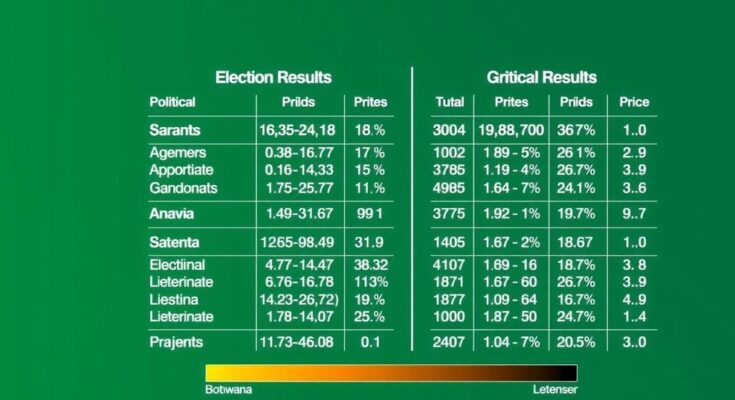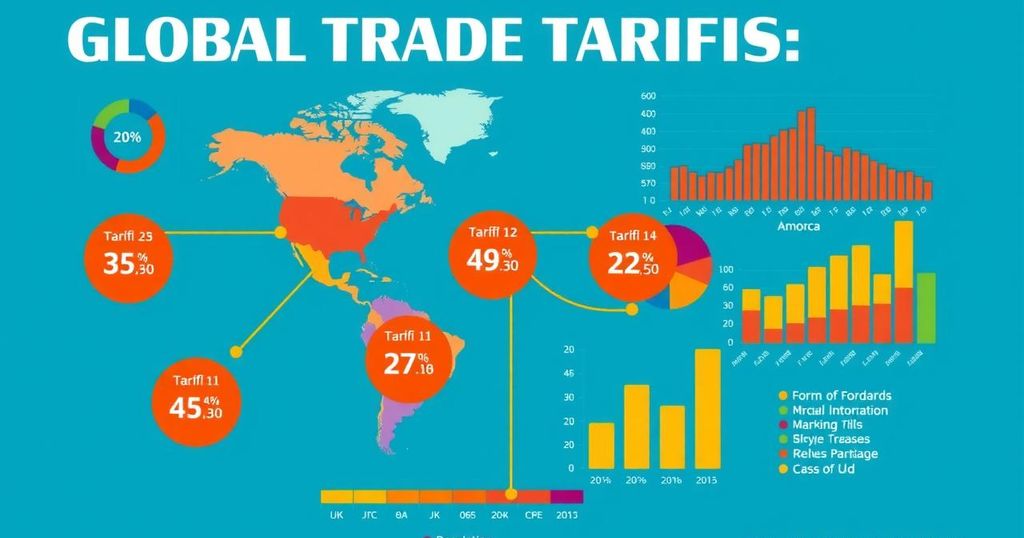In a historic electoral upset, the Botswana Democratic Party (BDP) was ousted from power by the Umbrella for Democratic Change (UDC) and its leader, Duma Boko. This change is indicative of widespread discontent among the populace, largely driven by economic challenges, particularly high unemployment and inadequate healthcare. The election marks a significant political shift in Botswana, with the UDC promising to address these pressing issues through economic diversification and social reforms.
In a remarkable political upheaval, the Botswana Democratic Party (BDP), which has dominated since the nation’s independence in 1966, was ousted from power during the recent elections, marking a historical shift in Botswana’s political landscape. The opposition alliance, known as the Umbrella for Democratic Change (UDC), led by presidential candidate Duma Boko, achieved considerable success, winning 28 of the 61 parliamentary seats. This transition raises critical queries regarding Botswana’s future, especially as it confronts economic difficulties and the urgent call for diversification beyond its diamond-dependent economy. Botswana’s stability and prosperity have long hinged on its wealth of natural resources, particularly diamonds, which constitute over 80 percent of its exports and a significant portion of its GDP. However, the latest elections revealed an electorate disillusioned with the BDP’s governance, exacerbated by the adverse effects of falling diamond prices and a soaring unemployment rate that has surged over 27 percent, especially among the youth. Amidst these economic challenges, public sentiment shifted against the BDP, culminating in a decisive rejection at the polls. As the election results continued to unfold, it became clear that half of the contested constituencies had already been won by opposition candidates, effectively breaking the BDP’s longstanding hold on power. Former President Ian Khama’s support for opposition candidates further diluted BDP’s strength, highlighting internal rifts. The BDP’s defeat can be attributed to several pressing issues, prominently including high unemployment, inadequate healthcare access, and a minimal wage insufficient to meet living costs. Mr. Bongani Malunga insightfully observed the government’s failure to address these fundamental concerns, stating, “BDF lost power due to a few factors. The first one would be unemployment. There is a high unemployment rate in the country. A lot of the youth are frustrated.” Duma Boko, a prominent lawyer and former opposition leader, capitalized on the electorate’s dissatisfaction by positioning himself and the UDC as the agents of change. With a promise to tackle economic diversification, job creation, and educational reforms, Boko’s campaign resonated with voters keen for a new direction. In a reflective moment after the election results were announced, President Mokgweetsi Masisi conceded to reporters, “We got it wrong big time in the eyes of the people… I will step aside,” demonstrating an acknowledgment of the party’s failures to connect with its constituents.
The Botswana Democratic Party (BDP) has been a formidable political entity since the country gained independence from British rule in 1966. It is one of the longest-serving political parties in Africa, traditionally enjoying broad support due to the nation’s economic prosperity driven by diamond mining. Despite this historical strength, the recent election results indicate a significant shift in the political atmosphere, with citizens expressing their growing frustration over economic issues, particularly the high unemployment rate and inadequate public services. As opposition parties capitalized on citizen discontent, Botswana appears poised for substantial political and economic change under new leadership.
The BDP’s unexpected electoral loss signals a pivotal moment in Botswana’s democratic evolution, illuminating the electorate’s desire for change amid pressing economic challenges. The successful ascendance of the UDC not only reflects a rejection of the status quo but also underscores the necessity for improved governance, economic diversification, and the prioritization of essential public services. As Duma Boko assumes leadership, the focus will shift to fulfilling the promises made during the campaign, particularly concerning job creation and sustainable economic strategies that align with the aspirations of the Botswana populace.
Original Source: www.theeastafrican.co.ke




